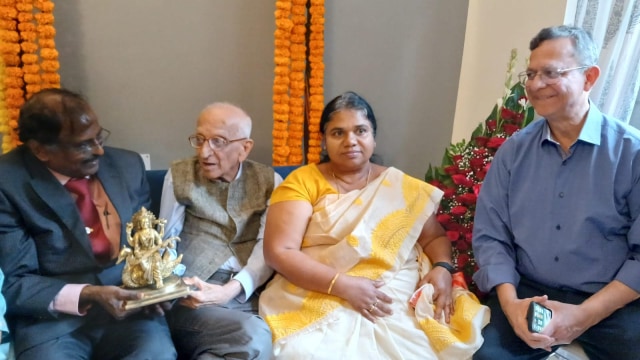Prof Eknath Chitnis, veteran scientist who pioneered India’s space programme, dies at 100
Eknath Chitnis was handpicked by Vikram Sarabhai to develop the country’s space programme and played a key role in establishing the Indian Space Research Organisation (Isro).
 Chitnis also served on the Board of Directors of Press Trust of India from 1983 to 2010, twice serving as its chairman.
Chitnis also served on the Board of Directors of Press Trust of India from 1983 to 2010, twice serving as its chairman.Veteran space scientist Professor Eknath Vasant Chitnis passed away in Pune on Wednesday. He was 100.
Among the pioneers of the country’s space programme, Chitnis had played a key role in establishing the Indian Space Research Organisation (Isro). His last rites will be performed in Pune on Wednesday afternoon.
Handpicked by Vikram Sarabhai, the father of India’s space programme, Chitnis was known to be his right-hand man and led a team that scouted for a launchpad, before zeroing down on Thumba in Thiruvananthapuram, and later Sriharikota along the coast of Andhra Pradesh.
Chitnis had retired as the director of the Space Application Centre in Ahmedabad in the mid-1980s, following which he, along with his wife, the late Kumud Chitnis, settled in Pune. His most significant contribution came through the Satellite Instructional Television Experiment (SITE) in 1975-76, which he directed. This project conducted educational programmes in 2,400 villages across six states using Nasa’s ATS-6 satellite, and laid the groundwork for the digital revolution.
An alumnus of Sir Parashurambhau College, Wadia College, and the prestigious Massachusetts Institute of Technology (MIT) in the USA, the senior space scientist delivered lectures at the Media and Communications Department at the Savitribai Phule Pune University for over two decades until early 2013.
Chitnis also served on the Board of Directors of Press Trust of India from 1983 to 2010, twice serving as its chairman. His diverse contributions earned him the Padma Bhushan in 1985.
Born in Kolhapur in pre-Independent India, Chitnis did his schooling and higher education in Poona (now Pune). Chitnis is survived by his son, Professor Chetan Chitnis, who is a senior scientist studying malaria at the Pasteur Institute in Paris, Chetan’s wife and two granddaughters. Chetan Chitnis received a Padma Shri earlier this year, making them a rare father-son Padma awardee duo, and reflecting a family legacy of scientific excellence.







